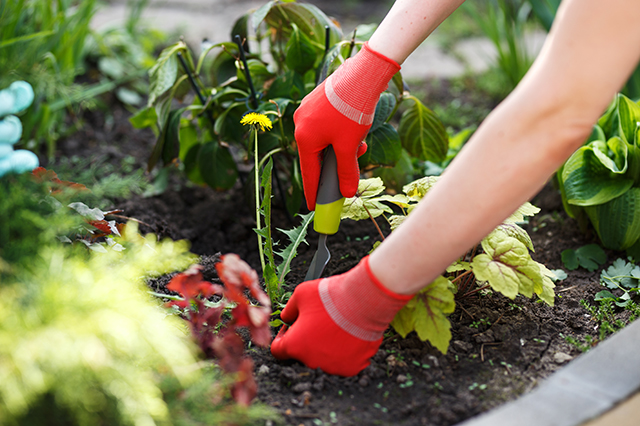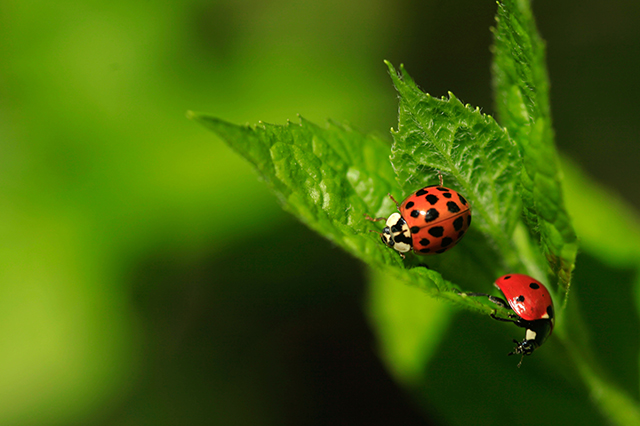Garden pests can be a huge nuisance for any home gardener, but thankfully there are tried and true methods that get rid of these pesky bugs. Although sprays and other chemicals can work, most gardeners would prefer to use natural methods for garden pest control. Resorting to chemical-free methods is often your best bet, because pesticides and insecticides will kill off the beneficial bugs as well, and you might just end up with a lot of immune garden pests! Try out these seven all-natural methods for easy garden pest control.
1. Release beneficial insects to eat garden pests
Beneficial insects are a great asset for protecting your garden. These are predator insects who are not interested in eating your plants, but the bugs who make your plants home. Do your best to find out what kind of garden pest is causing the issue, and then choose predators that prey on that bug.
For instance, the Trichogramma wasp is a good choice to reduce the number of caterpillars in your garden. This species prevents the caterpillar from emerging early in the growing season, so it’s a good preventative measure. Ladybugs are great for getting rid of aphids and whiteflies while praying mantises eat most garden pests. You can plant flowers that attract these beneficial species, but for fast results, it’s usually better to purchase the insects and release them yourself.
And remember—spiders are your friend! Although we might think to kill a spider the moment we see one in the house, these arachnids are actually a great form of free garden pest control. Their webs trap a lot of flying pests like flies, and having them in your garden is always a good thing. So next time you see a spider in the house, put it in your garden instead of swatting it!
2. Attract birds, frogs
Birds are also a wonderful asset for eliminating caterpillars and other unfavorable insects. Set up a few bird feeders and a water supply in your garden to encourage them to spend time there and hunt for any insects. After all, who doesn’t love birds showing up in their garden? Frogs and toads are also extremely useful. You don’t even need a pond to attract them; just put out a pile of rocks or logs or leafy ground cover, and frogs and toads will come to eat your slugs, flies and other garden pests.
3. Use diatomaceous earth
Spread a light layer of diatomaceous earth around the edge of your garden beds; this substance will actually damage insects and slugs and reduce the pest population. It doesn’t work in the same way that a chemical does to keep out pests, so the bugs can’t become immune to it.
4. Japanese beetles? Use milky spore.
Milky spore is a safe, non-toxic bacteria that feeds on immature Japanese beetles. Apply milky spore to the soil and the grub population in your garden will likely decrease. Fortunately, this substance only affects Japanese beetle grubs and doesn’t poison any of the beneficial insects you want in your garden.

5. Keep your garden healthy and clean
Getting rid of sick or weak plants actually helps to keep garden pests out. Also, be sure to do a thorough job of removing weeds, and spreading clean mulch on the soil. Keep your garden tidy and fresh and your pest problem will be less of an issue. Remember, your best defense in avoiding pest damage is maintaining strong and healthy plants, so do your best to provide your plants with the highest quality nutrients and fertilizer.
6. Snail bait
Snails and slugs are notorious pests that love to leave holes in garden plants. One of the most effective ways to get rid of these garden pests is to leave out small platters of beer. Slugs will be attracted to the alcohol and drown. If this doesn’t work, you can wait until dusk when snails and slugs come out to feed and dispose of them by hand. Really any slow, large insect can be picked off by hand, so if you’re not squeamish touching bugs, this is always a good strategy.
7. Invest in chickens
Laws for keeping chickens vary, but usually this requires a permit. If you’re able to take care of chickens, they’ll provide you with a number of benefits: eggs, companionship, and of course, pest control! Chickens do a great job of eliminating annoying garden pests like grasshoppers, flies and June bugs. But watch out—chickens can also do damage to your veggies and plants if you’re not careful, so be sure to keep an eye on them and don’t give them free rein of your whole garden.
Do you have your own tried and true garden pest control method? Share below!
3 Thoughts on “7 Surefire Methods to Eliminate Garden Pests”
Leave A Comment
Comments are subject to moderation and may or may not be published at the editor’s discretion. Only comments that are relevant to the article and add value to the Your AAA community will be considered. Comments may be edited for clarity and length.
















One year, we had a mystery on our hands. We kept finding butterfly (monarch) wings on the ground by our large butterfly busy. what is eating the butterfly’s? One day, Neighbor and I were chatting and admiring the butterfly bush with many bees and butterflies.
We noticed a Large praying mantieus grab a monarch and who was happyly feeding on the monarch body and letting the beautiful wings fall to the ground. Horrors!
We gently moved the mantieus to the larger honey suckle bush, hoping that the butterflies would stand a better chance of survival. Lesson on Nature. Maggie
My grandfather had a bird feeder. Birds control insect populations. Also plant marigolds, mints and basil. Insects can’t stand the smell. While it is true basil does attract some insects, it keeps the majority away.
Always look forward to reading your interesting tips.